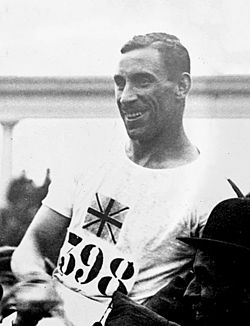History
The club was founded by philanthropist Quintin Hogg in 1883, and they were known for four years as the Hanover United AC, and were the athletics arm of Quintin Hogg's Regent Street Polytechnic. [1] The Polytechnic Harriers were based at the Chiswick track and their history with racing events predated "the Poly" since they oversaw walking races from London to Brighton as far back as 1897. [2] [3]
The club has long ties to what is now the London Marathon. In 1908 they oversaw the opening and closing ceremonies for the 1908 Olympics, the Game's marathon, and played a large part in the development of the Polytechnic Marathon, which ran from 1909- 1996. [4] [5] [6] [7]
In 1920, Harry Edward became Great Britain's first Black medalist at the Olympic Games. [8]
In 1985 The Polytechnic Harriers merged with The Royal Borough of Kingston AC, a women's club that evolved from Surrey AC, to become the Kingston AC and Polytechnic Harriers (Kingston & Poly). The Polytechnic's Kinnaird and Sward Trophies are still contested annually at Kingston & Poly's home track, which was originally constructed as a cinder track in 1961 [9] and is adjacent to the football stadium at Kingsmeadow. The Polytechnic Marathon is no longer held, having been superseded by the London Marathon. Kingston & Poly's men now compete nationally in the British Athletics League and, at area level, the men and women operate jointly in the Southern Athletics League, although they were relegated to lesser divisions in 2016. [10]
This page is based on this
Wikipedia article Text is available under the
CC BY-SA 4.0 license; additional terms may apply.
Images, videos and audio are available under their respective licenses.


